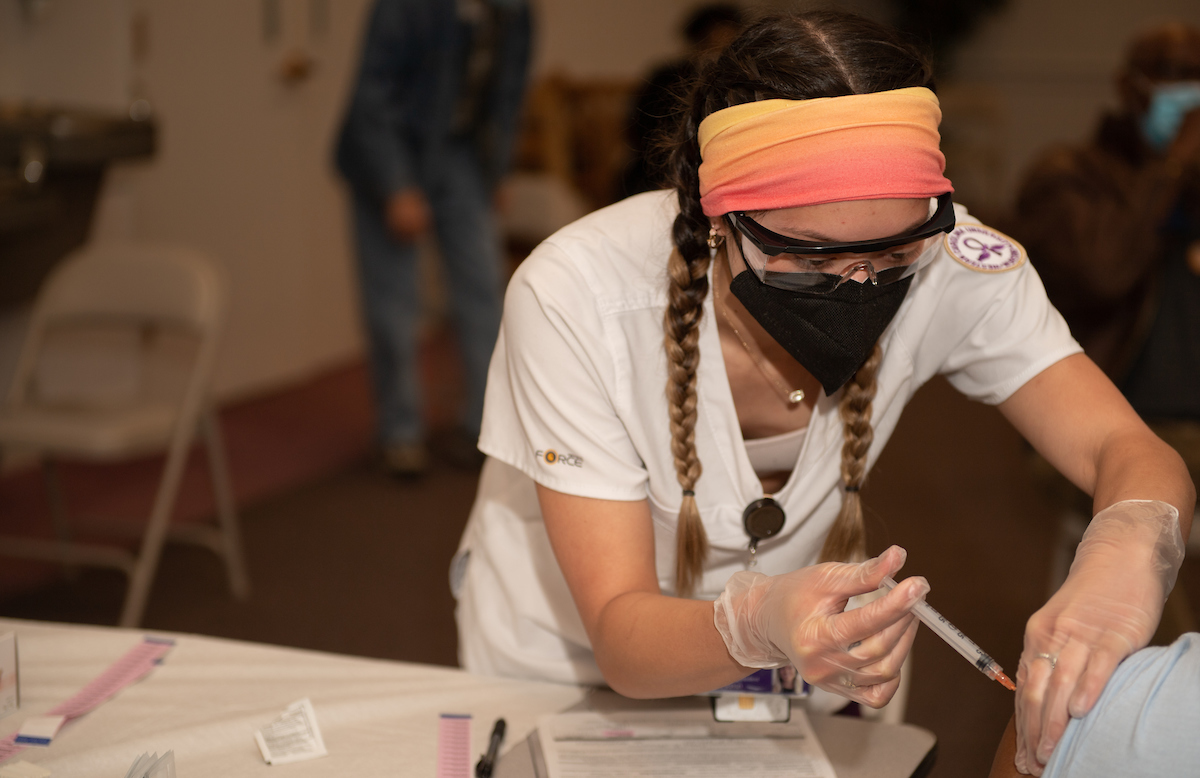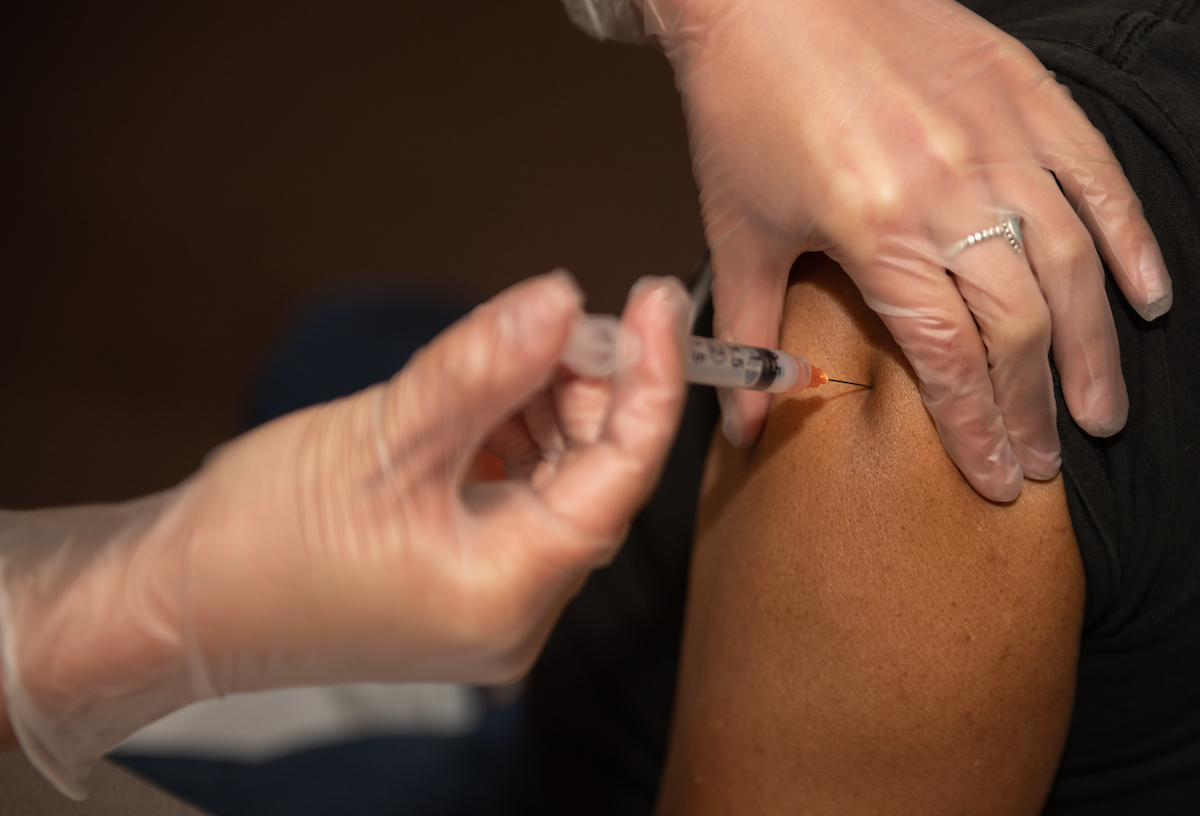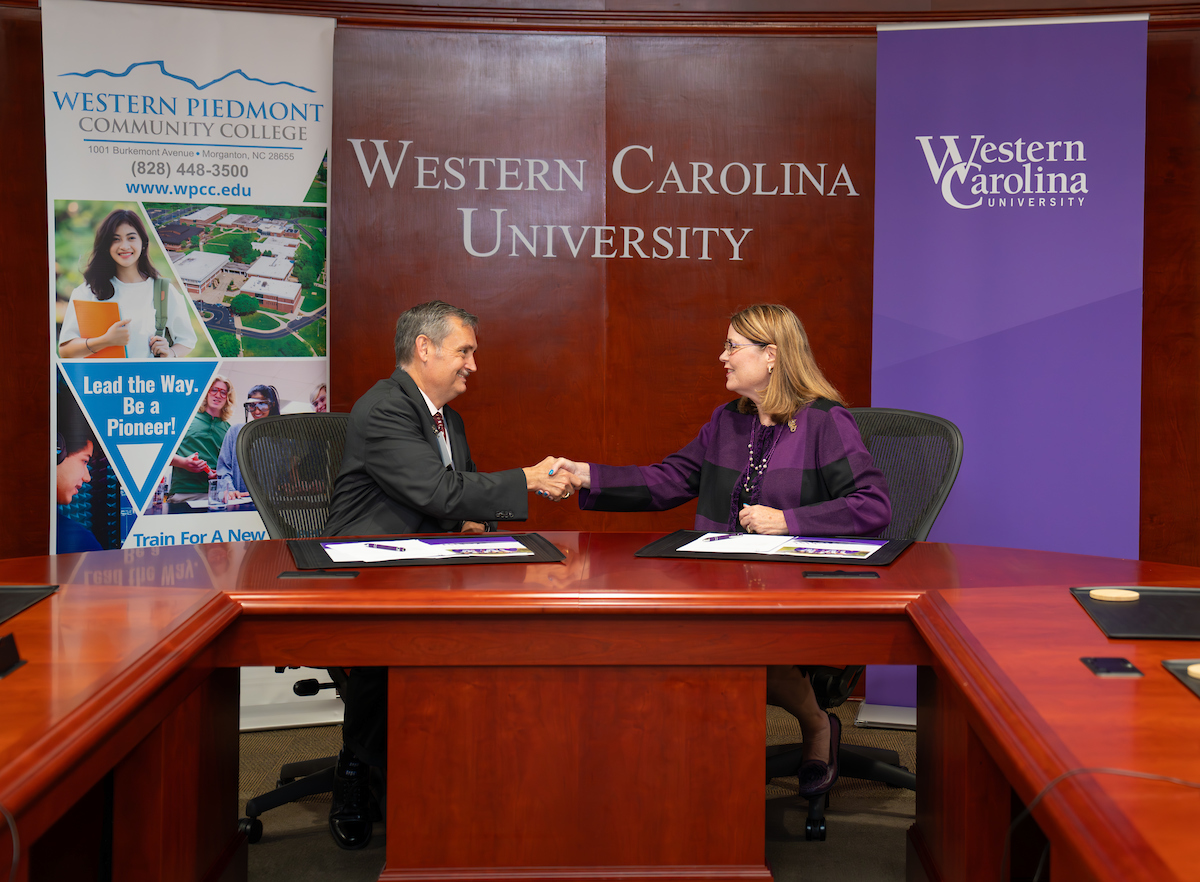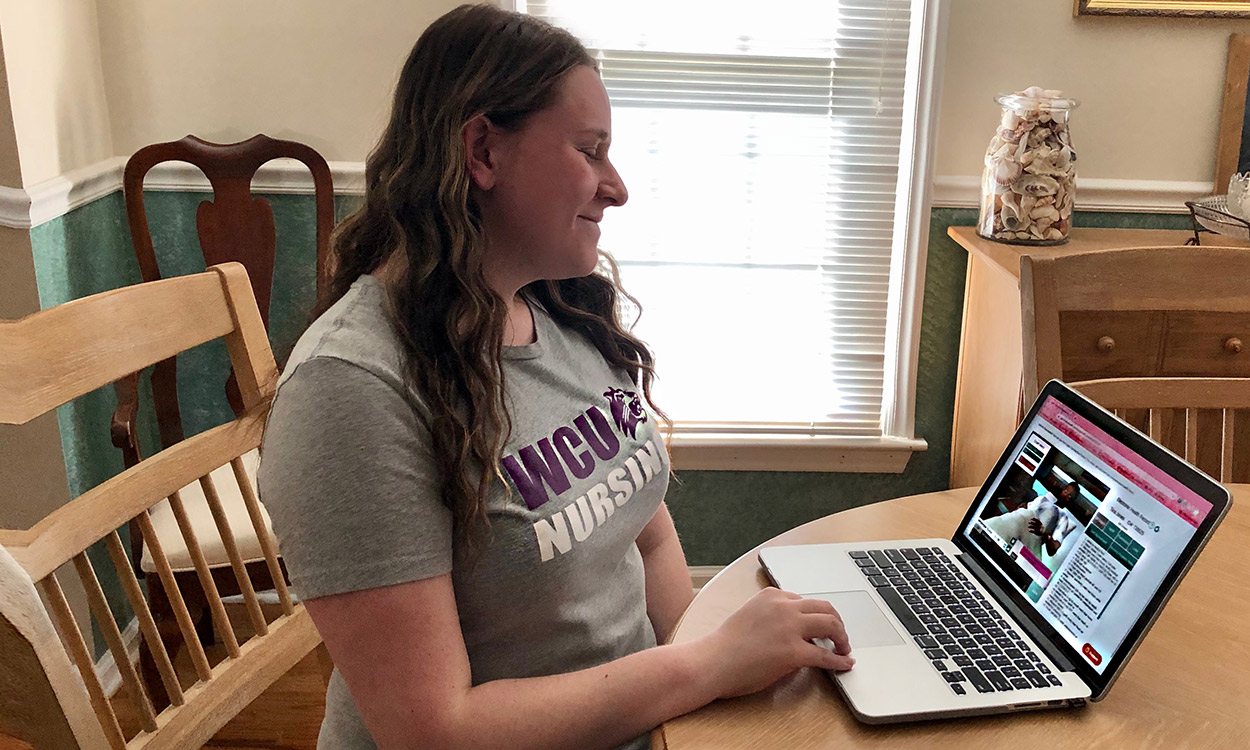






Nursing Students Assist with COVID-19 Shots
WCU students’ service learning project helps rally community support for COVID-19 vaccination efforts
There were nursing students giving shots, church members helping people find their
place in line, fraternity brothers directing traffic and other volunteers filling
in where needed.
Sometimes it takes a village to protect a village, and that certainly was the case
when a group of Western Carolina University nursing school students decided to make their senior service learning project a COVID-19 vaccination clinic
for Buncombe County’s African American community.


The students, under the direction of WCU nursing assistant professor Elizabeth Sexton, partnered with Buncombe County Health and Human Services, Asheville’s Tried Stone
Missionary Baptist Church — a predominantly African American church — and other organizations
to host the clinic, Friday, Feb. 26, at the church’s fellowship hall. The clinic was
held primarily for people of color age 65 years of age or older, and health care workers.
The second shot will be administered March 26, also at Tried Stone.
The idea came to Sexton during conversations last fall with a colleague at the Buncombe
County health department with whom she had partnered on previous student service learning
projects. COVID-19 dominated their conversation. “We knew the vaccine was coming,”
Sexton said. “We started talking about how we could reach out to higher risk groups.
We had seen how much the Black community was impacted, especially in the spring in
New York, just super high rates of both hospitalization and death, a much higher disparity
there. We really wanted to make sure the African American churches and community and
Latino communities, too, had an opportunity to receive the vaccine, because it really
impacts both in a more severe way.”

Alfred Blount, pastor of Tried Stone Missionary Baptist Church for 22 years, said his church was eager to host the project because it made it easier for members of his congregation and community to get vaccinated. Many residents weren’t able to travel to other sites offering the shot or were on what seemed like endless waiting lists with thousands of other people, he said. “Once we found out how many doses of the vaccine they got, we started getting people signed up,” he said.
"We really wanted to make sure the African American churches and community and Latino communities, too, had an opportunity to receive the vaccine, because it really impacts both in a more severe way.”
And that wasn’t all that kicked in gear. Church volunteers secured appointments for all 300 Moderna doses and turned their fellowship hall into a vaccination clinic. Goody bags with personal protection equipment and informational and health brochures were provided by WCU’s nursing school, Nurses Christian Fellowship and Center for Community Engagement and Service Learning; Asheville YMCA and Full Circle Recovery Center. WCU’s Sigma Alpha Epsilon fraternity provided parking assistance.


Haley Schronce, a senior nursing student from Lincolnton, was one of three students
who helped organize the event. She marveled at the positive response to the clinic
as the fellowship hall filled with people eager to get the vaccine. “Everybody needs
a chance to get the vaccine. I’m really grateful we can do it at a local church, so
everybody feels comfortable and safe to come here,” she said.
“I’ve heard a lot of talk from people about not wanting to get a vaccination because
they don’t know what’s in it, and we’ve been used as guinea pigs before,” said Blount,
who graduated from WCU in 1988 with a marketing degree. “We tried to educate them
and give them the information we’re getting from the Centers for Disease Control and
Prevention. We wanted to help them make a well-informed decision.”

It worked. Lajuana Montgomery of Asheville said she had been hesitant to get a shot until her
sister-in-law, Pam Johnson, a registered nurse and chair of the church’s health ministry,
talked to her about the importance of getting vaccinated. “I liked how everything
was so organized and well put together,” Montgomery said, after receiving her shot.
That the clinic ran so smoothly was no accident, said JeWana Grier-McEachin, executive
director of the Asheville Buncombe Institute of Parity Achievement, a non-profit agency
that works on health equity issues, and helped with the clinic. “About five years
ago we started the praise initiative in partnership with Mission Health to designate
churches as healthy churches,” Grier-McEachin said. “Tried Stone is one of the gold
churches … because of its efforts to ensure its congregation is healthy. Because of
that, this was the perfect way to take that to the next level. They were ready because
they have hosted other screening events before.”
“Everybody needs a chance to get the vaccine. I’m really grateful we can do it at a local church, so everybody feels comfortable and safe to come here…”
Johnson said the mission of the church’s health ministry is to promote health and
nourish the mind, body and spirit. “The ministry allows us to work with community
health professionals to empower the congregation to advocate for their health through
the educational workshops, screenings, and seminars,” the church hosts, she said,
including mental health issues.
Andie Ervay, a fourth semester nursing student from Gastonia who will graduate in
May, said working on such an important project has been an invaluable lesson. “The
biggest part was getting the vaccines approved by the state because there is such
a shortage,” she said. “It’s just crazy how much goes in to responding to a pandemic.
Everyone so far has been extremely thankful to get the vaccine. Everyone’s just excited
to get it and return to somewhat of a normal life and not have to live in fear of
contracting COVID-19.”

"It was great seeing how different communities and different systems can come together for the greater good, for one purpose."
For Sexton, service learning projects like this one are important because they help
lay the groundwork for future collaborations. “We partner already with many agencies
in Asheville, because we’re building bridges, we’re building connections,” she said.
Kimberlyn Metcalf, a nursing student from Madison County, said all the hard work it
took to assemble a vaccine clinic for 300 people finally paid off. “We definitely
hit a lot of obstacles, but seeing it today, it all worked out perfectly. We’re seeing
the people we wanted to see,” she said. “I really feel like we’re making a difference
for them. It was great seeing how different communities and different systems can
come together for the greater good, for one purpose. The biggest surprise was how
willing every person here was to help. It’s amazing.”
Find Your Spot, Take Your Shot
Western Carolina University’s Regional Vaccine Clinic is staffed by student, faculty, and staff volunteers from across campus. The clinic is now open, with appointments available every week, for anyone in the region who is included in the eligible groups as set by the North Carolina Department Health and Human Services. To find your group, make an appointment and learn more about the clinic, visit vaccine.wcu.edu

